MySQL is a relational database that stores and manages all data types without considering the difference between discrete and continuous data. The platform is open-source and relies on Structured Query Language (SQL) queries for operation.
MySQL’s functionality goes beyond simple data storage. When connected to BI tools like Looker Studio, it can be used to generate detailed reports. For example, you can sync Google Search Console data into MySQL and then use Looker Studio to pull that data and create comprehensive search engine ranking reports.
MySQL Functionality
MySQL integrates several features to ensure you get the most out of the database. Let’s explore them in detail below:
- Data types: supports all data types, such as string, numeric, and binary data. When dealing with continuous vs discrete data, MySQL ensures proper storage, with discrete data usually being stored as strings or integers and continuous data as doubles or floats.
- Scalable: is designed to accommodate almost any data amount. This enables businesses to expand their operations without needing to invest in additional tools to manage increasing data volumes.
- Compatible with other systems and languages: you can run it on different operating systems like Linux, MacOS, Windows, etc. The database also supports multiple programming languages—PHP, Java, C, Python, and more.
MySQL Data Transfer
MySQL allows you to transfer data between different systems, databases, or environments effortlessly using any of these methods:
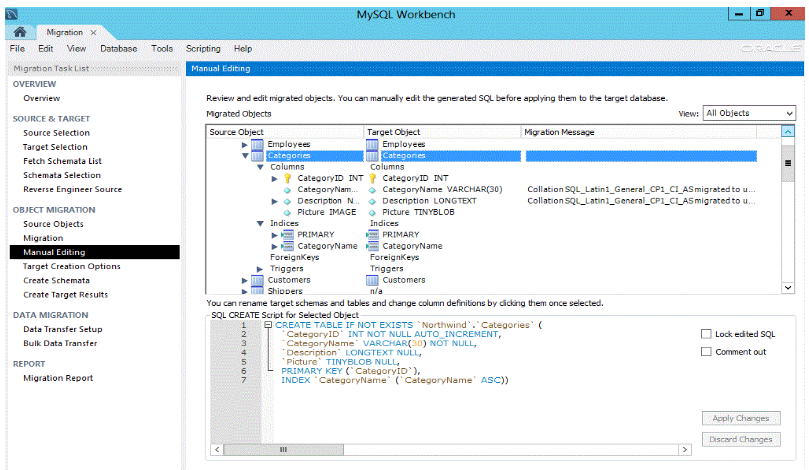
- MySQL Workbench: provides features like export and import wizards that enable you to transfer or copy data between databases.
- MySQL dump: this is a command-line tool that helps you generate backups of databases or specific tables. Then, it sends the data into SQL files to be imported into other MySQL instances.
- Database replication: copies data (including inserts, deletes, and updates) from a master database to other slave databases in real-time or near real-time.
- ETL tools: MySQL can be connected to ETL tools, which help it extract data from marketing analytics tools, other databases, social media platforms, web services, etc.
MySQL Reporting
You can generate reports with this database to gain vital insights into your data. A range of reporting options are available; you just choose what suits you best. Check them below:
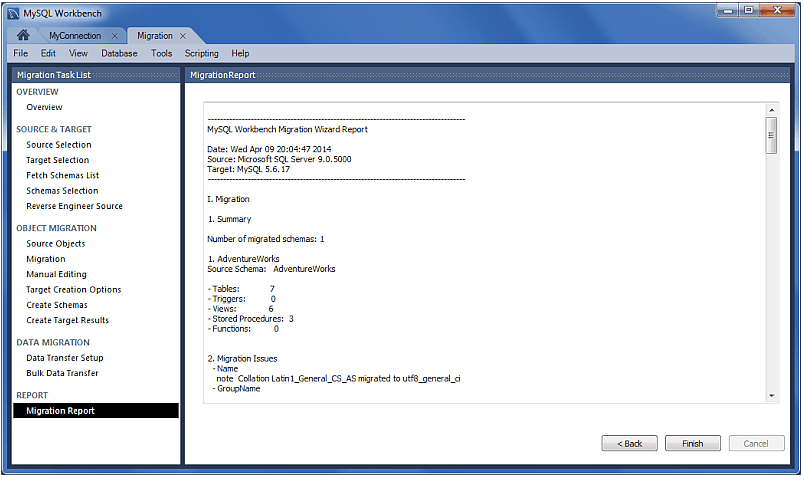
- MySQL Shell: enables you to run queries within MySQL Shell’s interactive prompt to generate reports or create scripts with predefined queries that are automatically implemented when MySQL Shell is launched.
- Third-party tools: MySQL easily connects with BI tools like Looker Studio and Power BI. This makes it possible to generate, format, and visualize reports using these third-party tools for data-driven decisions.
- MySQL Workbench reporting: MySQL Workbench has built-in reporting tools, which you can leverage to generate reports based on predefined queries. A good example is a migration report that helps summarize the details of a data migration process. It offers information about data types (discrete vs continuous), schema differences, etc.
MySQL Customer Support
There’s a live chat window, but you have to fill out a data collection form first to initiate a conversation with the support team. This is a good option if you want issues addressed faster. More customer support alternatives are described below:
- Knowledge base and documentation: features articles, FAQs, user guides, etc., to help users use the platform more easily.
- Online forums: offers access to MySQL community where users share experiences, give advice, and troubleshoot issues.
- Phone: provides different phone numbers users from different regions can use to contact the sales team directly.
- Commercial support: includes several support paid plans where users get to talk to expert support engineers any time of the day, throughout the week.
Generally, customers have good things to say about MySQL’s support services. A good example is the client below, who is impressed with the online forums that allow him to learn from other users.

MySQL Price Breakdown
The community-maintained MySQL is free and licensed under the General Public License (GPL). This means users can use, modify, and distribute it at $0, provided they adhere to the GPL rules. However, if you want to change the source code, you can subscribe to one of the commercially licensed MySQL software.
MySQL Free Trial
As mentioned earlier, the core MySQL database is free, so you can use its features at zero cost for as long as you want. However, extra expenses may arise from personnel, hardware, and software needed to set up and maintain the database environment.
MySQL Price Packages
MySQL price usually depends on the software provider. In this case, let’s focus on the packages offered by Oracle:
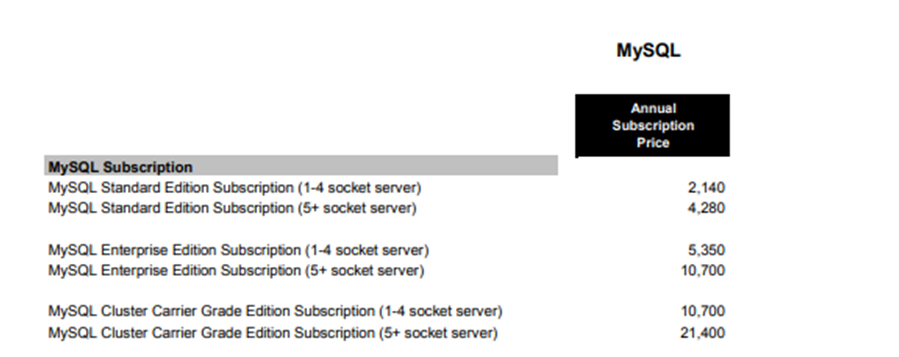
- MySQL Standard Edition ($2,140-$4,280/year): features InnoDB, so it’s ACID compliant. It also delivers high-performance, scalable apps and premier support. This makes it ideal for businesses needing access to MySQL features without extensive add-ons.
- MySQL Enterprise Edition ($5,350-$10,700/year): ideal for users (medium to large businesses) who want advanced features, management tools, and technical support. This enables them to enjoy high scalability, security, and uptime while reducing the complexity of creating and developing critical MySQL apps.
- MySQL Cluster Carrier Grade Edition ($10,700-$21,400/year): supports clustering and real-time data processing. It also combines linear scalability and high availability, which are essential for telecom and other industries with mission-critical apps.
MySQL Customer Reviews
Customers are pleased with MySQL, going by the 4.4 out of 5 rating the database has on G2. They particularly appreciate its ease of use, open-source accessibility, and robust feature set. However, some users note limitations in certain features and restricted database support. Let’s delve into a few reviews below:

The customer above is impressed with MySQL’s user-friendliness, good community support, and open-source nature.
To be honest, anyone who has interacted with a database before can navigate this platform with less hassle. The intuitive interface makes it easy for users to run queries, manage databases, and handle data migrations. Sure, the open-source model is an advantage, but open-source documentation can sometimes lack consistency or depth, especially in complex environments.

This user loves the database’s support for multiple programming languages and extensive flexibility that enables them to optimize data processing and customize it to their needs.
Justifiably so, MySQL’s adaptability ensures organizations can manage diverse data types extracted using different data collection methods, hence catering to specific organizational requirements. Even then, careful configuration is needed when optimizing MySQL. Otherwise, users may experience performance issues across various programming languages.
MySQL Pros and Cons
| Pros | Cons |
| Open-source: available to different kinds of users for free. | Steep learning curve: requires a deep comprehension of SQL and database administration, making the learning curve relatively steeper for novices. |
| Reliable: known to handle large-scale mission-critical apps comfortably. | |
| Scalable: can accommodate large data volumes, including discrete vs continuous data formats. | |
| High compatibility: supports multiple programming languages and operating systems. | |
| Integration: connects with many platforms, including ETL tools, marketing analytics tools, etc. |
Verdict
MySQL is a database you can rely on when it comes to storing data, managing product inventories, generating reports, and more. It’s compatible with various operating systems, including Windows, macOS, and Linux. MySQL also supports popular programming languages like Python, Java, and PHP, offering flexibility for developers. As your data grows, MySQL scales effectively, handling large volumes without the need for additional tools. However, its learning curve can be challenging, especially for new users. Fortunately, strong community support is available, making the process smoother and less daunting.
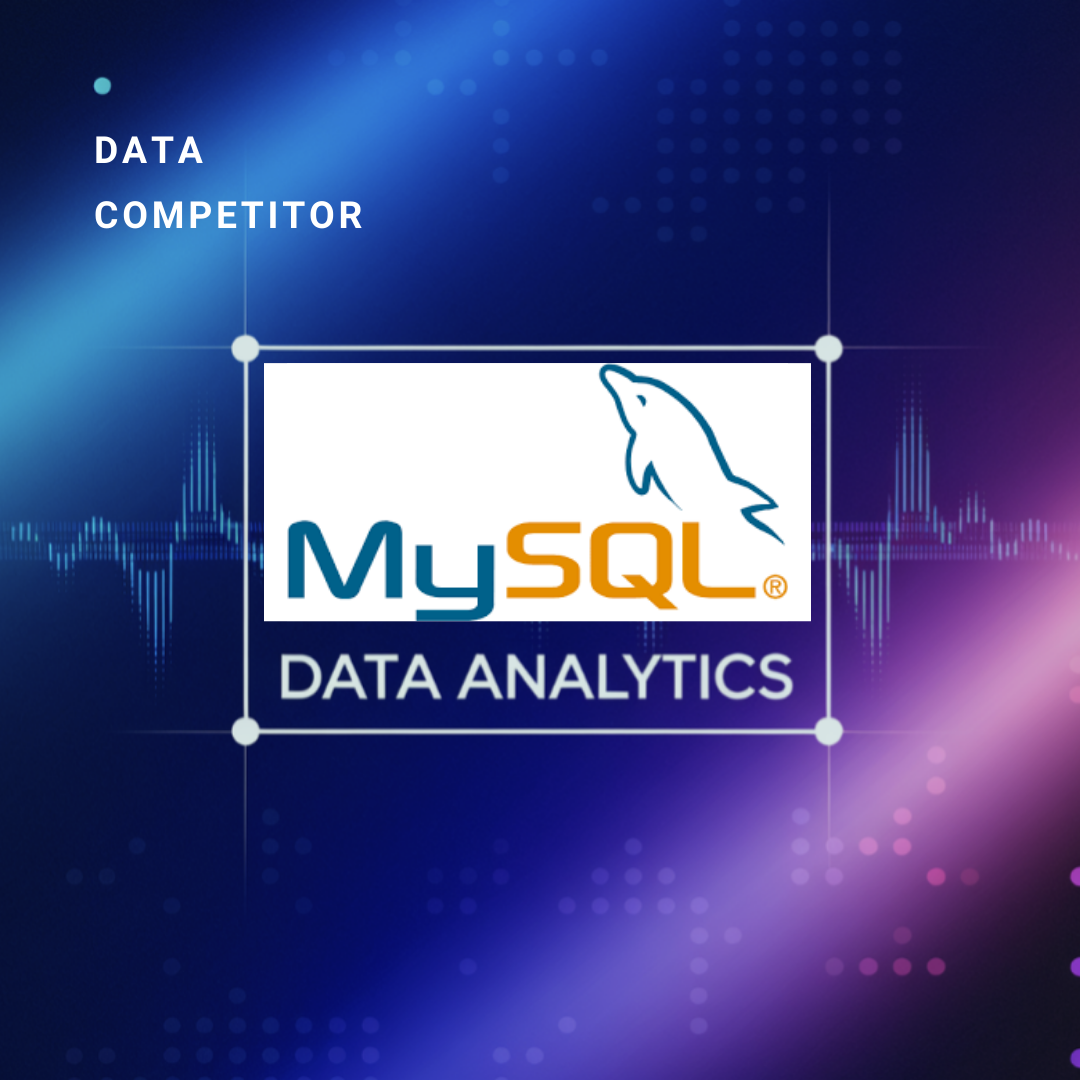
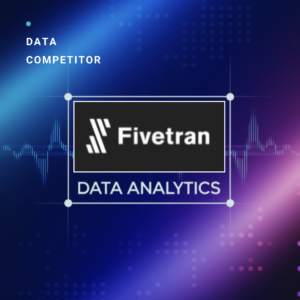
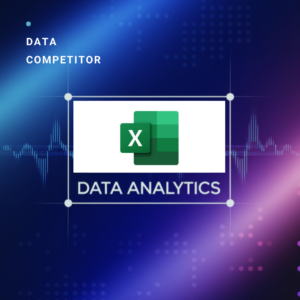
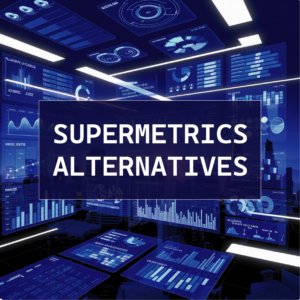

Leave a Reply